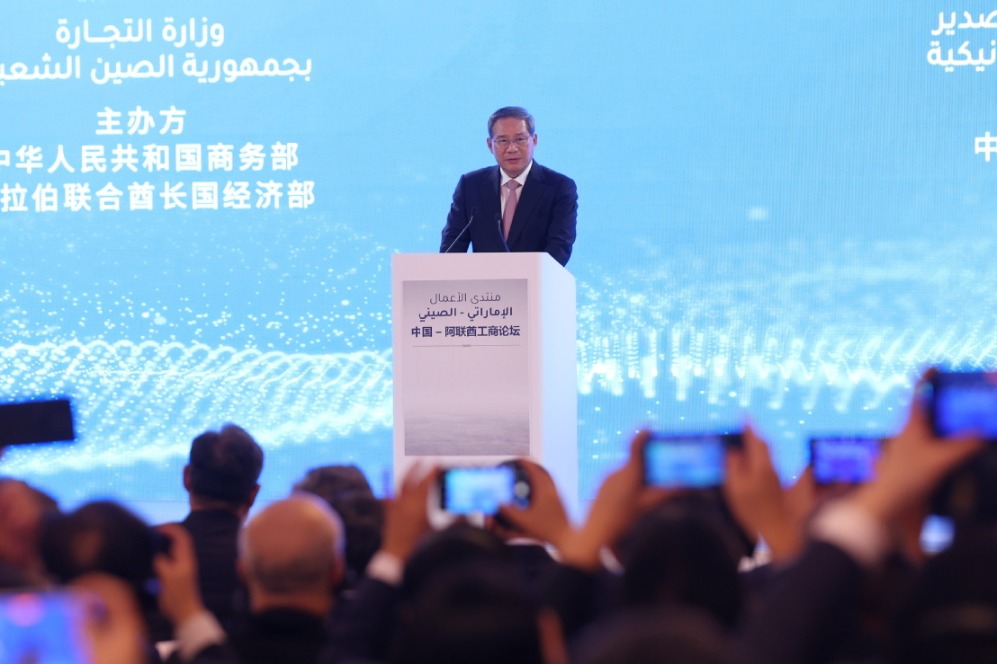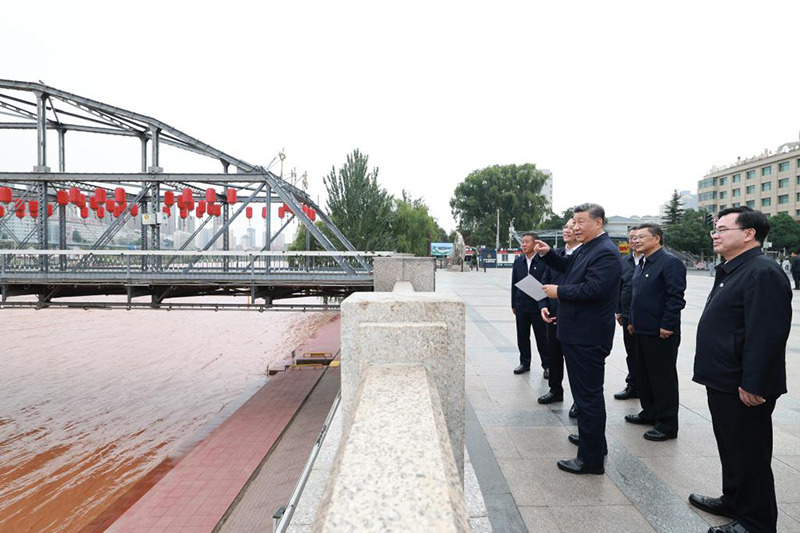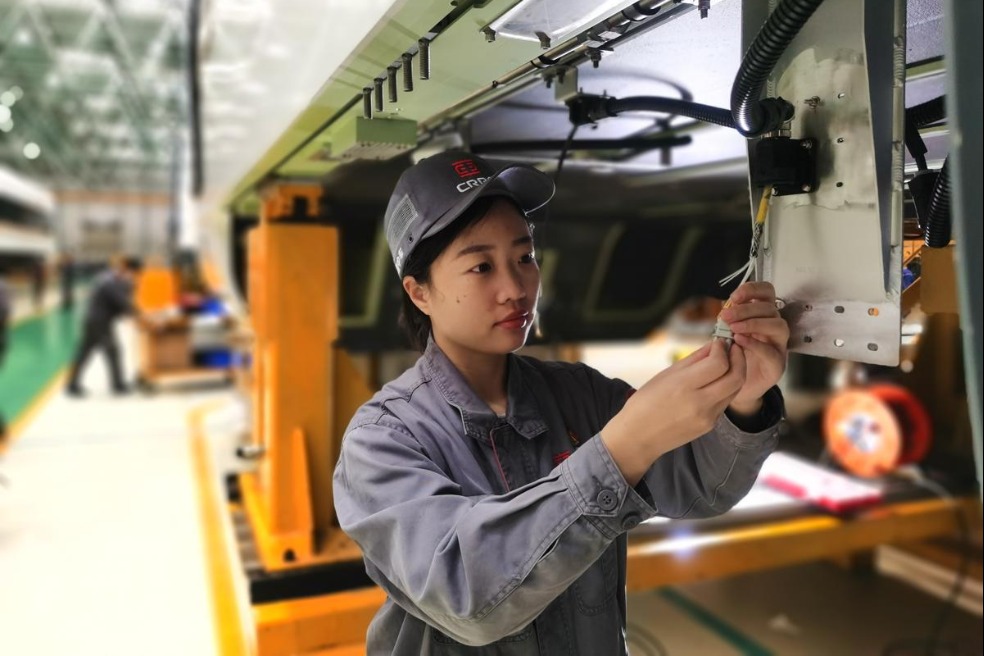Startups rise on capital ideas


A lively entrepreneurship landscape, proactive government support and increasing channels for securing investment are helping Hong Kong's fledgling tech firms prosper, injecting life into the local venture capital ecosystem. Yet industry players are calling for a more professional funding vetting process and a broader investment spectrum. Li Xiaoyun reports from Hong Kong.
Kerr Xu Ke — co-founder and CEO of LaSense Technology, which specializes in laser sensing instruments — proudly recalls how the startup won millions of renminbi in an angel investment in early 2021, saying it's an achievement that "created quite a stir" among its peers at Hong Kong Science Park, branded as the "symbol" of the city's innovation and technology drive.
Securing the funding, he says, was some achievement as Hong Kong startups rarely got investments in renminbi at the time.
Xu's decision to seek funding on the Chinese mainland was a strategic move and a response to the climate. Startups in Hong Kong had found it challenging to secure investments from local private market, as a 2020 survey by the Hong Kong Trade Development Council showed around 10 percent of local startups had obtained funding from angel investors or venture capital. On the mainland, the private capital market remained vibrant in 2020.
The COVID-19 pandemic intensified the challenges facing Hong Kong startups. Travel curbs restricted Xu to the city, depriving him of fundraising opportunities from the mainland and global markets. So he moved to the mainland as the company, which he founded at the start of the pandemic, was looking for financing support.
Since the angel investment, LaSense has continued its upward trajectory, having secured two additional rounds of investment from the mainland in November 2021 and July last year.
Xu, however, believes that the time is ripe to focus on raising funds in Hong Kong, as many technology entrepreneurs agree that the buzz over entrepreneurship, an array of government-backed investment programs, and a growing number of mainland investors coming to the special administrative region to explore opportunities, have created a favorable climate for venture capital.
Entrepreneurship on the rise
A report by InvestHK — an SAR government agency geared to attracting external investment to the city — said the number of startups in Hong Kong reached 4,257 last year — up 34 percent from 2019.
Xu's experience echoes this trend. When LaSense joined Science Park's three-year incubation program in August 2020, "The buildings were underoccupied. Now, businesses have to compete to be there," he says.
As one of Hong Kong's largest tech hubs, Science Park saw its tenancy surpass 90 percent as of May last year, prompting a second phase of expansion that will add more than 13,000 square meters of space by early 2025.
The heightened demand from tech startups is mirrored at Cyberport — another key player in the city's digital technology landscape — that attracted nearly 1,000 companies from 2018 to 2023. Cyberport is embarking on a fifth expansion phase that's expected to be completed next year, offering a further 66,000 square meters of space.
The growing entrepreneurial spirit is also evident at Hong Kong's universities. Almost all tertiary institutions now encourage faculties and students to start their own ventures through guidance programs and funding support. This has led to more professors and students getting involved in the financial arena.
The University of Hong Kong's Entrepreneurship Engine Fund revealed its first potential investment partners on Sept 4. Launched in June last year, the fund will operate as a "fund of funds", meaning it will invest in funds rather than directly in stocks, bonds or other forms of securities, and seek venture capital firms from both local and external markets to invest in seed and early-stage technology companies nurtured by the university.
Huang Mingxin, a professor at the Department of Mechanical Engineering at HKU, founded Dynano Semiconductor Technology in October last year, reflecting a significant shift in attitudes toward entrepreneurship within academia. He recalls the time when universities were too mired in research, and pursuing business was often viewed as "getting off track".
"The mindset in the past was that academia should remain lofty and detached from making profits, thus stifling the entrepreneurial drive among professors," says Huang. Encouragement from the government and universities has fostered a more supportive atmosphere.
As a university spinoff, Huang's company, which delves into the development of innovative chip packaging materials for electric vehicles to beat the limitations of traditional materials with low melting points, is among the first 11 tech startups to join the HKU Techno-Entrepreneurship Academy, which opened its doors on Sept 4. The academy is a collaborative effort by the HKU and Qianhai, a cooperation zone between Hong Kong and the mainland's tech hub Shenzhen.
The dynamic startup panorama offers local investors a wider range of profit-making options.
In addition to receiving university support, Huang's company also secured an investment of HK$15 million ($1.9 million) from three funds, with Hong Kong Inno Angel Fund as the lead investor.
Expanded capital pool
Innovation and technology remains a fashionable term for the HKSAR government. In Chief Executive John Lee Ka-chiu's two policy addresses, promoting innovation and technology is a priority among initiatives designed to boost development. By attempting to create new opportunities for Hong Kong beyond its traditional trading and finance realms, the government is taking the lead in expanding the venture capital pool by introducing more investment programs aimed at supporting tech startups.
The Innovation and Technology Commission now has three funding programs for startups, launched in 2014, 2017 and 2023 respectively, with the funding ceiling having gone up dramatically to HK$4.5 million under the Technology Startup Support Scheme for Universities (TSSSU), and to HK$100 million for the Research, Academic and Industry Sectors One-plus Scheme (RAISe+). Funding mechanisms have evolved through direct grants to collaborative investments with venture capital firms.
Xu describes the startup funding landscape during his early entrepreneurial days as "bleak", with the TSSSU the lone option for well-structured funding. LaSense, co-founded by Xu and his PhD supervisor Ren Wei at the Chinese University of Hong Kong, obtained three years of the TSSSU financial aid amounting to HK$2.1 million. Funding for the program was then capped at HK$700,000 annually, a limit that has now gone up to HK$1.5 million.
While the amount isn't large, the review and disbursement process is efficient, helping to put LaSense on the right path, says Xu. He received the funds in April 2020, four months after submitting his application.
Datality Lab — an education tech startup founded in 2018 — is also among the recipients of government financial support, allowing it to roll out various versions of its flagship product — a system that harnesses artificial intelligence to train users in communication skills.
Founder Roland Leung Tai-yin believes government funding serves mainly as a safety net to prevent startups from going under. These funds helped him to ride out the storm during the pandemic as private venture capitalists sat on the sidelines.
Among the aid programs, the most talked about is RAISe+, with many startups saying they're eyeing it as their next platform for raising funds. However, the program's effectiveness, one year after its rollout, isn't without controversy.
The HKSAR government began the second round of applications under the program, setting Oct 31 this year as the deadline for applications. With the aim of matching funding for at least 100 university-backed research teams that have the potential to become startups, RAISe+ allows these teams to wrap up their projects in two phases within five years. The first phase is about the transformation and realization of research and development outcomes within three years, while the second phase focuses on commercialization. Applicants can join from either the first or second phase, depending on their projects' stage of development.
The government announced in May the first round of 24 projects slated for funding under the program from among 94 applications. Evaluation criteria include the potential for turning outcomes into viable products, a team's technical know-how and management skills, as well as how well the project can benefit society.
Under the first phase, the government, industries and universities chipped in at a 2-to-1 ratio. For the second phase, the government and industries will contribute half, meaning investment from industries is mandatory.
Leung sees the program's high funding cap as a boon for companies that have been in business for years, like his, and says that getting to the second phase will help his company market its products more effectively.
Xu is also preparing to apply for the second phase. He agrees with the idea of the government and investment firms co-investing because it means a venture capital fund will have already done its homework on a project before the government decides to jump in.
Lingering concerns
But some anonymous entrepreneurs are casting doubt on the professionalism of the vetting process, saying there aren't enough professional investors on the RAISe+ steering committee, and there're too many professors — who may not truly understand the market.
Among the 13 committee members who are from the research, academic and industry sectors, six are scholars, five are from the business sector, and two are investors.
While startup founders say the lively entrepreneurship landscape, coupled with more proactive government funding, has helped to improve Hong Kong's venture capital ecosystem, they're split on whether startups can truly secure financing more easily, as they believe local investors tend to focus on limited sectors, while investor enthusiasm has yet to recover from COVID-19.
Tommy Wei Minchen, a professor with the Department of Building Environment and Energy Engineering at Hong Kong Polytechnic University, co-founded Guardian Glow last year. The startup focuses on developing artificial intelligence-powered personal smart devices and solutions for technologies in augmented reality. It has snagged seed funding from a firm in Singapore and is in talks with mainland investors. Wei also hopes to attract investors from the United States which the company views as an important market.
Comparing his outreach to investors in these fields, Wei says his area of operation may not be a popular option for Hong Kong investors who seem to prefer biomedical or materials science projects. The view that local investors are interested in life science projects is shared by Leung.
Although certain sectors aren't investors' first choice, and investors are still playing it safe, Xu says investment sentiment in Hong Kong can be lifted as the downturn in the mainland's venture capital market may prompt investors to redirect their efforts to Hong Kong.
A study by financial services firm CVINFO shows that in the first half of this year, 2,393 new funds were set up on the mainland — a year-on-year drop of 39 percent — with $220 billion raised in venture capital — down 38 percent from 2023. Last year's performance was also less than encouraging. According to research firm Zero2IPO Group, the mainland investment market recorded 9,388 cases last year, down 11.8 percent on a yearly basis.
Mainland investors are now turning to Hong Kong for opportunities. Six Chinese venture capital firms have clinched a deal last year with the City University of Hong Kong to jointly plow 1 billion yuan ($140 million) into the institution's startup-incubation program, HK Tech 300. In October, two funds under Qi-ming Venture Partners, which is known for backing business heavyweights like Meituan and Xiaomi, took the plunge, becoming co-investment partners in the HKSAR government's Innovation and Technology Venture Fund.




































